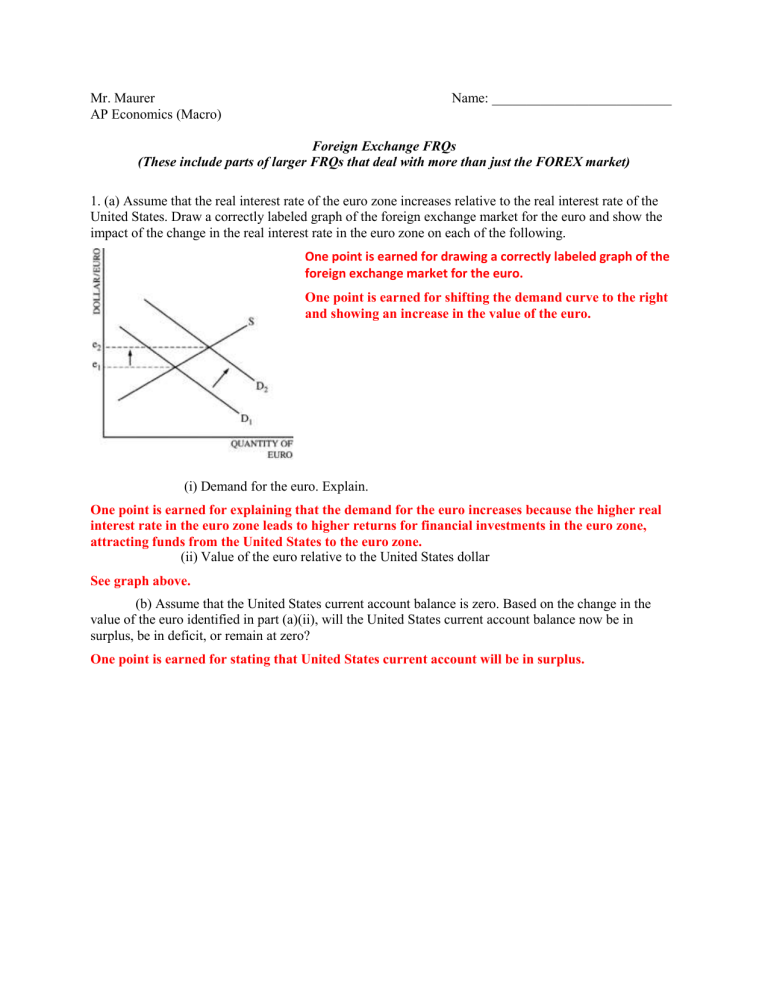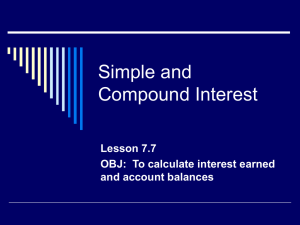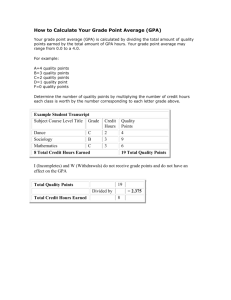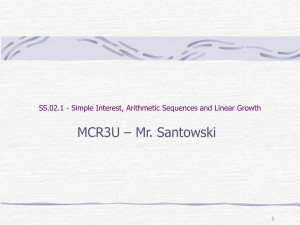Mr. Maurer Name: AP Economics (Macro) Foreign Exchange FRQs

Mr. Maurer
AP Economics (Macro)
Name: __________________________
Foreign Exchange FRQs
(These include parts of larger FRQs that deal with more than just the FOREX market)
1. (a) Assume that the real interest rate of the euro zone increases relative to the real interest rate of the
United States. Draw a correctly labeled graph of the foreign exchange market for the euro and show the impact of the change in the real interest rate in the euro zone on each of the following.
One point is earned for drawing a correctly labeled graph of the foreign exchange market for the euro.
One point is earned for shifting the demand curve to the right and showing an increase in the value of the euro.
(i) Demand for the euro. Explain.
One point is earned for explaining that the demand for the euro increases because the higher real interest rate in the euro zone leads to higher returns for financial investments in the euro zone, attracting funds from the United States to the euro zone.
(ii) Value of the euro relative to the United States dollar
See graph above.
(b) Assume that the United States current account balance is zero. Based on the change in the value of the euro identified in part (a)(ii), will the United States current account balance now be in surplus, be in deficit, or remain at zero?
One point is earned for stating that United States current account will be in surplus.
2. Suppose Rankinland has a current account deficit. Rankinland’s currency is called the bera.
(a) What will initially happen to the current account deficit in Rankinland if Ranklinland’s GDP increases? Explain.
* One point is earned for stating that the current account deficit will increase.
* One point is earned for explaining that the increase in real GDP increases income, which causes imports to increase and net exports to decrease.
(b) What will happen to the international value of the bera solely due to the change in the real
GDP from part (a)? Explain.
• One point is earned for stating that the international value of the bera will decrease.
• One point is earned for explaining that the decline in the international value of the bera is due to an increase in the supply of the bera.
3. A United States firm sells $10 million worth of goods to a firm in Argentina, where the currency is the peso.
(a) How will the transaction above affect Argentina’s aggregate demand? Explain.
• One point is earned for stating that Argentina’s aggregate demand will fall because the purchase results in increased imports or decreased net exports, which are components of aggregate demand.
(b) Assume that the United States current account balance with Argentina is initially zero. How will the transaction above affect the United States current account balance? Explain.
• One point is earned for stating that the United States current account will be in surplus or increases because exports are recorded as a credit in the current account.
(c) Using a correctly labeled graph of the foreign exchange market for the United States dollar, show how a decrease in the United States financial investment in Argentina affects each of the following.
(i) The supply of United States dollars
(ii) The value of the United States dollar relative to the peso
• One point is earned for a correctly labeled graph of the dollar market.
• One point is earned for showing a leftward shift of the supply curve and indicating that the value of the dollar against the peso increases, using arrows, labels or dotted lines.
(d) Suppose that the inflation rate is 3 percent in the United States and 5 percent in Argentina.
What will happen to the value of the peso relative to the United States dollar as a result of the difference in inflation rates? Explain.
• One point is earned for stating that the peso will depreciate against the dollar.
• One point is earned for explaining that the higher inflation rate in Argentina makes U.S. goods less expensive (or more attractive) than Argentinean goods.
4. Assume that the real interest rates in both Canada and India have been 5 percent. Now the real interest rate in India increases to 8 percent.
(a) Using a correctly labeled graph of the foreign exchange market for the Canadian dollar, show the effect of the higher real interest rate in India on each of the following.
(i) Supply of the Canadian dollar. Explain.
* One point is earned for the correctly labeled graph of the foreign exchange market.
• One point is earned for showing that the supply of Canadian dollars will increase, or the supply curve will shift to the right.
• One point is earned for explaining that Canadian investors will be attracted by the higher real interest rate in India and increase their purchase of Indian financial assets.
(ii) The value of the Canadian dollar, assuming flexible exchange rates
• One point is earned for showing that the Canadian dollar depreciates against the
Indian rupee.
(b) Using a correctly labeled graph of the loanable funds market in Canada, show how the increase in the real interest rate in India affects the real interest rate in Canada.
• One point is earned for a correctly labeled graph of the loanable funds market.
• One point is earned for showing a leftward shift of the supply curve and an increase in the interest rate.
5. How does the depreciation of a country’s currency in the foreign exchange market affect the real gross domestic product and price level of an open economy in the short run? Explain.
• One point is earned for stating that real GDP will rise and the price level will rise, because the depreciation of the currency will cause net exports to rise and the aggregate demand curve to shift to the right.
6. (a) Assume that the government of Country Z increases its budget deficit. Using a correctly labeled graph of the loanable-funds market, show the effect of the increased deficit on the real interest rate.
• One point is earned for a correctly labeled graph of the loanable-funds market.
• One point is earned for showing a rightward shift of the demand curve for funds and concluding that the real interest rate will rise. (A leftward shift of the supply curve is accepted.)
(b) Given the change in the real interest rate in part (a), what will be the effect on each of the following on the foreign exchange market?
(i) Supply of Country Z’s currency. Explain. (This is sort of a tricky one that we haven’t
looked at before.)
• One point is earned for stating that the supply of Country Z’s currency will decrease.
• One point is earned for the explanation that the higher interest rate reduces the outflow of funds to countries that now have a relatively lower interest rate.
(ii) The value of Country Z’s currency • One point is earned for concluding that the value of Country Z’s currency will rise or Country Z’s currency will appreciate.
(c) Given your answer in part (b) (ii), what will be the effect of the change in the value of
Country Z’s currency on Country Z’s exports?
• One point is earned for stating that Country Z’s exports will decrease.
• One point is earned for the explanation that the appreciating currency makes Country Z’s goods relatively more expensive.
7. Balance of payments accounts record all of a country’s international transactions during a year.
(a) Two major subaccounts in the balance of payments accounts are the current account and the financial account (née capital account). In which of these subaccounts will each of the following transactions be recorded?
(i) A United States resident buys chocolate from Belgium. One point is earned for stating that the transaction will be recorded in the current account.
(ii) A United States manufacturer buys computer equipment from Japan. One point is earned for stating that the transaction will be recorded in the current account.
(b) How would an increase in the real income in the United States affect the United States current account balance? Explain.
*One point is earned for stating that the current account balance will decrease or move toward a deficit.
• One point is earned for explaining that the increase in income causes imports to increase.
(c) Using a correctly labeled graph of the foreign exchange market for the United States dollar, show how an increase in United States firms’ direct investment in India will affect the value of the United
States dollar relative to the Indian currency (the rupee).
*One point is earned for a correctly labeled graph of the foreign exchange market for the U.S. dollar.
• One point is earned for shifting the supply of U.S. dollars to the right and showing a depreciation of the dollar.








